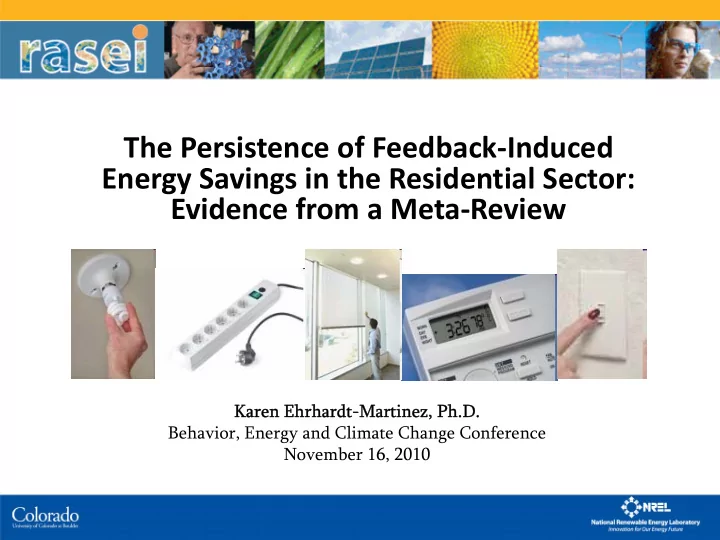

The Persistence of Feedback ‐ Induced Energy Savings in the Residential Sector: Evidence from a Meta ‐ Review Karen Ehrhardt-Martinez, Ph.D. Karen Ehrhardt-Martinez, Ph.D. Behavior, Energy and Climate Change Conference November 16, 2010
The complete research report is entitled: Advanced Metering Initiatives and Residential Feedback Programs June 2010 Karen Ehrhardt-Martinez – RASEI John A. “Skip” Laitner – ACEEE Kat A. Donnelly – Empower Devices
An assessment of 61 primary research studies of 57 feedback Number Region of Studies Percent initiatives: – Several continents and 9 United States 33 57% countries – 21 studies 1974 ‐ 1994 – What we call the Europe 13 22% “Energy Crisis Era” – 36 studies 1995 ‐ 2010 – Canada 9 16% What we call the “Climate Era” Other 3 5%
Average Household Electricity Savings of 4 ‐ 12 Percent by Feedback Type 12.0% Real ‐ Time 9.2% Plus 8.4% Feedback Real ‐ Time Annual Percent Savings Daily/ 6.8% Feedback Weekly Real ‐ time info down to the Feedback Estimated Real ‐ time appliance level Feedback 3.8% premise Household ‐ level info Enhanced specific info, Web ‐ based advise on Billing energy audits daily or Household ‐ with info on weekly basis specific info, ongoing basis advice “Indirect” Feedback “Direct” Feedback (Provided Real Time) (Provided after Consumption Occurs)
Which Behaviors Change?
The Question of Persistence Do the feedback-induced behaviors and energy savings persist over time? • What should we expect? • What methods were used to evaluate the persistence of savings? • What does the historical evidence tell us?
The Question of Persistence What we might expect: Why Feedback is Likely to Result in Persistent Savings: • Feedback helps consumers to learn the energy consequences of specific behaviors, and that information reduces uncertainty about the effectiveness of new behaviors. • Feedback helps people to establish new habits and they no longer need to be energy conscious all the time. New behaviors become automatic. • Feedback elicits energy conserving behaviors and after a while people adapt their attitudes to their new behaviors and energy conservation becomes a new part of their identity. Why Feedback is Unlikely to Result in Persistent Savings • The novelty of energy feedback may wear off and people will fall back into old habits and practices.
The Question of Persistence What Methods were used to Assess Persistence? • An evaluation of the relationship between study duration and energy savings. • A qualitative evaluation of the 28 studies that reported the on persistence of energy savings. • A qualitative evaluation of the 9 studies that considered the question of persistence over the longest periods of time.
Study Duration and Energy Savings X Strike One
Study Duration and Energy Savings Among the larger studies there is no clear � distinction between duration and energy savings. � Among the smaller studies, the relationship continues to be evident.
Persistence of Savings Across 28 Studies � 70% of studies showed persistent or increased savings. 83% of studies � showed persistent or increased savings.
Evidence from 9 Longest Studies Study Duration : 12 to 36 months Most Studies did not test the effect of removing feedback. � All Studies with consistent feedback had persistent savings – 2 found that savings increased with time. � Two Studies tested for persistence following the removal of feedback. Savings did not persist in one � (Van Houwellingen 1989), they did in the other (Staats et al. 2004).
A Supportive Social Environment Matters Staats et al. (2004) Study : Looked at a range of sustainability behaviors of participants in the EcoTeam Program over 3 years. Purpose : to assess the ability of feedback and a supportive social environment to create durable changes in behaviors.
Some Conclusions � Most Feedback-induced savings come from changes in everyday practices or energy stocktaking. � In some cases, shorter studies had larger savings. These saving were likely to result from trials that were held during the summer months and did not indicate a lack of persistence. � A qualitative assessment of all 23 studies, indicated that three-quarters had persistent savings. � An assessment of the 9 longest studies indicated that savings are persistent when feedback is persistent or when feedback is provided in a supportive social environment.
Selected References Abrahamse, W.; L. Steg; C. Vlek; and T. Rothengatter. 2007. “The effect of tailored information, goal setting, and tailored feedback on household energy use, energy-related behaviors, and behavioral antecedents.” Journal of Environmental Psychology , 27: 265-276. Darby, S. 2006. “The Effectiveness of Feedback on Energy Consumption: A Review for DEFRA of the Literature on Metering, Billing and Direct Displays.” http://www.defra.gov.uk/environment/climatechange/uk/energy/research/pdf/enegyconsu mp-feedback.pdf. Oxford, UK: Environmental Change Institute, University of Oxford. Electric Power Research Institute. 2009. “Residential Electricity Use Feedback: A Research Synthesis and Economic Framework.” Report No: 1016844. Palo Alto, CA: EPRI. Electric Power Research Institute. 2010. “Guidelines for Designing Effective Energy Information Feedback Pilots: Research Protocols.” Report No: 1020855. Palo Alto, CA: EPRI. Staats, H.; P. Harland; and H.A.M. Wilke. 2004. “Effecting Durable Change: A Team Approach to Improve Environmental Behavior in the Household.” Environment and Behavior 36(3): 341–367 . van Houwelingen, J. T. and W. F. van Raaij. 1989. “The effect of goal setting and daily electronic feedback on in-home energy use.” Journal of Consumer Research 16, 98–105. .
For Further Information: Karen Ehrhardt ‐ Martinez , Ph.D . Karen.Ehrhardt@Colorado.Edu This presentation is This presentation is based on based on recent research by: recent research by: Karen Ehrhardt-Martinez, RASEI John A. “Skip” Laitner, ACEEE Kat A. Donnelly, EMpower Devices The complete research report is The complete research report is entitled: entitled: Advanced Metering Initiatives and Residential Feedback Programs Available from the American Council for an Energy-Efficient Economy: http://www.ACEEE.org/pubs/e105.htm
Recommend
More recommend